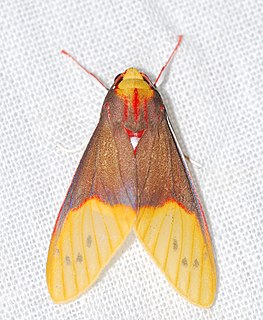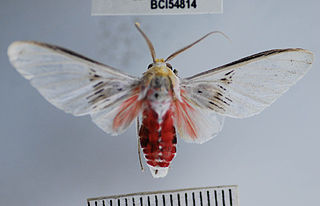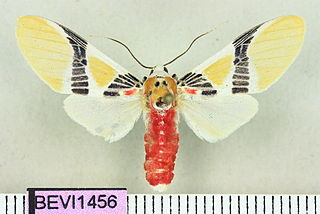Haemanota is a genus of moths in the family Erebidae. The genus was erected by George Hampson in 1901.

Eriostepta bacchans is a moth of the family Erebidae first described by William Schaus in 1905. It is found in French Guiana and Suriname.

Evius albicoxae is a moth of the family Erebidae. It was described by William Schaus in 1905. It is found in French Guiana and Peru.
Glaucostola binotata is a moth of the family Erebidae first described by William Schaus in 1905. It is found in French Guiana, Suriname, Guyana, Ecuador and Peru.
Glaucostola flavida is a moth of the family Erebidae first described by William Schaus in 1905. It is found in French Guiana, Guyana and Trinidad.
Haemanota affinis is a moth of the family Erebidae. It was described by Walter Rothschild in 1909. It is found in French Guiana, Suriname, Brazil, Venezuela and Bolivia.
Haemanota gibeauxi is a moth of the family Erebidae. It was described by Hervé de Toulgoët in 1989. It is found in French Guiana.
Haemanota griseotincta is a moth of the family Erebidae. It was described by Walter Rothschild in 1909. It is found in French Guiana and Suriname.
Haemanota prophaea is a moth of the family Erebidae. It was described by William Schaus in 1905. It is found from French Guiana in South America to Arizona in the southern United States.
Haemanota sanguidorsia is a moth of the family Erebidae. It was described by William Schaus in 1905. It is found in French Guiana, Suriname, Guyana, Venezuela and on Cuba.
Haemaphlebiella formona is a moth of the family Erebidae. It was described by William Schaus in 1905. It is found in French Guiana, Guyana, Amazonas and on Cuba.
Haemanota chrysozona is a moth of the family Erebidae. It is found in French Guiana.
Hyperthaema coccinata is a moth of the subfamily Arctiinae. It was described by William Schaus in 1905. It is found in French Guiana, Colombia, Peru and Bolivia.
Hyperthaema ruberrima is a moth of the subfamily Arctiinae. It was described by William Schaus in 1905. It is found in French Guiana.
Hypidalia sanguirena is a moth of the subfamily Arctiinae first described by William Schaus in 1905. It is found in Brazil, French Guiana, Venezuela, Ecuador and Bolivia.

Idalus aleteria is a moth of the family Erebidae. It was described by William Schaus in 1905. It is found in Costa Rica, French Guiana, Guyana, Peru, Bolivia and Trinidad.

Idalus carinosa is a moth of the family Erebidae. It was described by William Schaus in 1905. It is found in French Guiana, Brazil, Venezuela and Bolivia.
Idalus ochreata is a moth of the family Erebidae. It was described by William Schaus in 1905. It is found in French Guiana, Suriname and Venezuela.
Leucanopsis racema is a moth of the family Erebidae. It was described by William Schaus in 1905. It is found in French Guiana and Peru.

Trichromia gaudialis is a moth in the family Erebidae. It was described by William Schaus in 1905. It is found in French Guiana and Trinidad.




